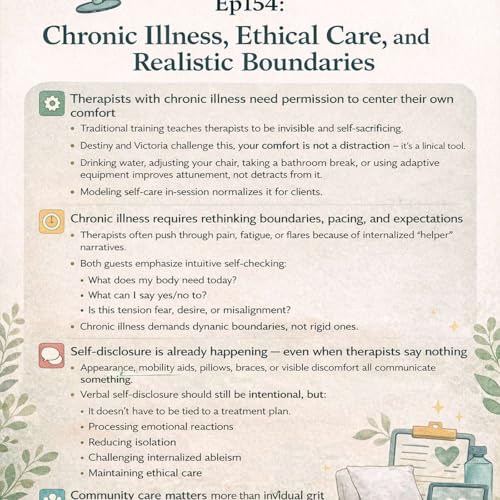Send us a text
Ever catch yourself packing everyone’s lunches, smoothing every conflict at work, and composing the perfect text so no one gets upset—then wonder why you’re exhausted and resentful? We dig into the quiet engine behind that burnout: overfunctioning, the reflex to manage other people’s needs, emotions, and outcomes at the expense of your own.
With therapist and maternal mental health specialist Megan MacCutcheon, we map how overfunctioning forms in families, workplaces, and partnerships, and why it always creates its counterpart—underfunctioning in others. No villains here, just patterns. We talk nervous system regulation as the starting line, because clear choices come from a grounded body, not a buzzing one. From there, we trade overexplaining for simple, firm language and introduce boundary stacking: set the limit, don’t re-litigate it, and refuse the pull to repair someone else’s feelings about your choice.
Expect relatable stories: the balloon arch no one photographed, the late-night email drafted ten times, and the lunchbox tailored to every preference. We use them to spot the real “why” behind doing more—validation, control, fear of conflict—and replace it with values-driven decisions and “good enough” standards. We also reframe motherhood and caregiving. Being loving doesn’t mean being limitless; modeling bandwidth, rest, and emotional responsibility teaches kids to function, not lean on you for everything.
You’ll leave with practical tools: a mental load audit to delegate, delay, or drop; quick body checks to prevent anxiety-driven fixes; short scripts that hold the line without drama; and a healthier definition of momentum—forward, intentional, and aligned with your energy. If you’re ready to stop carrying what isn’t yours and reclaim your time, attention, and peace, this conversation will help you take the first honest steps.
If this resonates, follow the show, share it with a friend who needs lighter shoulders, and leave a review to help more listeners find us. Your boundaries might be the permission someone else needs to set their own.
This podcast is meant to be a resource for the general public, as well as fellow therapists/psychologists. It is NOT meant to replace the meaningful work of individual or family therapy. Please seek professional help in your area if you are struggling. #breakthestigma #makewordsmatter #thingsyoulearnintherapy #thingsyoulearnintherapypodcast
If you or someone you know is struggling with mental health concerns, please contact 988 or seek a treatment provider in your area.
If you are a therapist or psychologist and want to be a guest on the show, please complete this form to apply: https://forms.gle/ooy8QirpgL2JSLhP6
Feel free to share your thoughts at www.makewordsmatterforgood.com or email me at Beth@makewordsmatterforgood.com
Support the show
www.bethtrammell.com

 Jan 30 202642 m
Jan 30 202642 m Jan 28 202611 m
Jan 28 202611 m Jan 26 202612 m
Jan 26 202612 m 47 m
47 m 8 m
8 m 22 m
22 m 35 m
35 m
